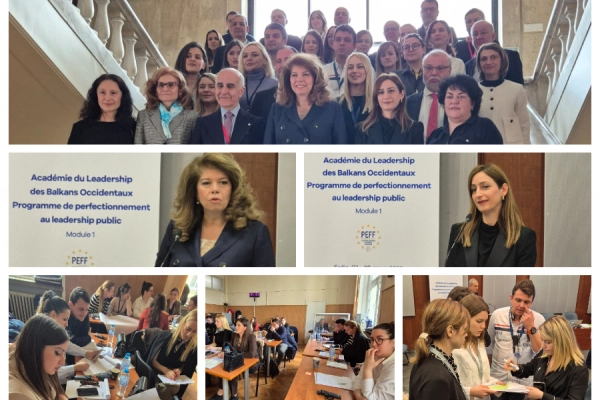
Launched the First Module of the Leadership Academy for Western Balkans Civil Servants in Partnership with the Agence Universitaire de la Francophonie
27-29 March 2025, Sofia, Bulgaria
Leadership Academy for civil servants from Western Balkans administrations, developed in close cooperation with the Agence Universitaire de la Francophonie (AUF) and the Bulgarian Institute for Public Administration (IPA), implemented the first of five modules between March and September 2025.
Iliana Yotova, Vice-President of the Republic of Bulgaria Prof. Mohamed Ketata, Director of l’École de Management de la Francophonie (ESFAM) and Pavel Ivanov, Director of the Bulgarian Institute for Public Administration, enriched the opening of the Academy.
Director Handjiska-Trendafilova underlined the importance of “focusing on self-leadership, strategic thinking & public sector innovation, project-based learning and one-on-one mentorship in empowering civil servants from the region in transformational leadership, risk management, and the future of public leadership. ReSPA, partnering with such strong partners, aims with this programme to foster a strong regional network of emerging public leaders to support ongoing public administration reform efforts in the Western Balkans.”.
The Academy is designed as a high-level “Executive Leadership” programme targeting public administration executives from the Western Balkans who already have experience in management but aim to strengthen their leadership potential. ESFAM organised the programme to combine theoretical models and practical training, focusing on both human and social capital development.
The first module featured a series of interactive sessions led by prominent French professionals with leadership backgrounds in academia, administration, and business. Through these sessions, participants navigated complex administrative environments, anticipated challenges, optimized their work, and contributed to the region's broader transformation of public administrations.
The second day of the Academy began with Mr Pavel Ivanov, Director of the Bulgarian Institute for Public Administration, discussing practical perspectives on EU integration-driven public administration reforms. Drawing on Bulgaria's experiences, he highlighted essential leadership skills needed to integrate public sector innovations. This session prompted participants to assess digital technologies' opportunities and risks in reform efforts.
Following this, a team of experienced French public sector professionals—Ms Véronique Chanut, Valérie Darthout, and Mr Karim Medjad—emphasized the significance of public sector innovations and leveraging digital technologies. They underscored the importance of individual skills and values in effective leadership. Participants engaged in interactive discussions, sharing their administrations' challenges related to efficiency, transparency, and technological capabilities.
The day concluded with practical exercises and group work, focusing on project cycle management as a framework to apply leadership skills in addressing public sector challenges. Each participant developed a project idea to resolve specific issues in their environments. These ideas were validated by experts and would be further developed through interactive online modules of WBLA, culminating in presentations at the final module in September 2025.
The final day of the Academy’s first module focused on Foresight in Public Leadership. Mr Karim Medjad explored evolving expectations from the public and civil servants, key transformation drivers, and the critical role of modern public leadership in shaping the future of public management.
In addition to formal training, the Academy also offers opportunities for peer learning, self-reflection, and mentoring. Participants had been encouraged to engage in project-based work within their administrations and to benefit from mentorship provided by experienced public sector leaders.
The upcoming modules were expected to be delivered in a hybrid format, combining online and in-person sessions, and to explore advanced topics such as strategic foresight, transformational leadership, and risk management.



